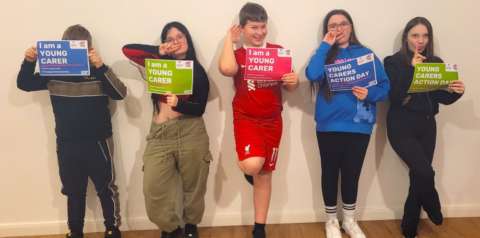
Carers Voices Conference 2020 – carers’ views
We were pleased to hold the Annual Voices Carers Conference during July, despite it being a very different format to our usual face-to-face event and with the added challenges of carers caring through a pandemic. Here we take a look at the key issues and experiences shared by 88 carers and 9 professionals who took part.
Caring through Coronavirus
Those who were new to caring and without established support felt particularly vulnerable during the pandemic. All of the carers we spoke to described having to “muddle through” and find out what support was available, with various changes to services and often poorly updated information. Access to Personal Protective Equipment (PPE) was a major issue for some carers and an area where there was significant confusion.
Several carers shared that as a result of the lockdown restrictions, the condition of the person they care for significantly deteriorated.
“I used to be able to take Mum out and about, as we could manage the transfer into the car, but she’s lost muscle strength during lockdown so we won’t be able to do this now. I worry about what that means for the future as it will be a lot harder to get out.”
For some carers, the generally poor level of carer awareness within the community, was worsened during the pandemic, and carers were even more hidden than they were before.
“Everyone is focused on the NHS – not carers – and we work longer hours!”
Loneliness and isolation
Carers shared that loneliness and isolation is a common impact of being a carer and when becoming a carer, life is different. They described the isolation which comes about from the lack of carer awareness and understanding amongst the general population, with the stigmatisation of carers and the people they care for. Isolation in decision-making was also identified as a challenge, compounded by inconsistent information about carer support, with many carers feeling that they are on their own and not knowing where to turn.
Isolation from the activities which caring prevents was highlighted, with carers describing a range of opportunities they have lost: work, friends, travel, future plans, and shared activities with the people they care for.
“I’ve lost friends because they don’t get it when you say you can’t go out.”
Health and social care
Feedback from carers identified a need for a flexible and carer-aware response from Health and Social Care. Carers do not receive relevant information and support when they need it, and Health and Social Care systems do not consistently work effectively for carers. Issues included access to timely information and missed opportunities to identify carers early and refer them for support. Carers often find out about support services by chance rather than as a routine response.
“What would make things easier would be if the people we care for were actually given proper diagnoses, and actual health and social care to meet their needs. Then we wouldn’t be having so much trouble as carers.”
Inconsistency in response to carers’ needs by Health and Social Care was a strong theme, although some carers reported positive experiences from health professionals . Access to services has been difficult for most carers. Carers reported their experience of a continued struggle to get the help needed, and this struggle has been intensified by the pandemic.
“There is too much inconsistency. Services need to communicate quicker, better, and clearer.”
Carers identified a number of barriers to accessing services, including concerns that people don’t know what they are eligible for. There is poor communication between services with carers having to repeat their story, and parent carers reporting that having to access certain levels of support via Children’s Social Care Level 4 has a stigma attached.
“During COVID-19, you can’t get through on the phone to the hospital and you’re not able to get any non-urgent treatment from them if you do get through. You can’t get a GP appointment for routine injections or anything, so what’s the point? My mum can’t get her regular B12 injection or her 3 monthly pain killing injection, so she is really suffering at the moment and I don’t know what to do.”
Carers emphasised the importance of health and social care practitioners taking their views into account, and involving them in care-planning and decision-making. They described the failure by some services to recognise the expertise which carers can bring, and this having a negative impact on the care plan and the carer’s wellbeing. Carers spoke positively of the variety of support they have accessed since finding out about that is available.
“When my son was admitted to an acute mental health ward, there was a carers pack on arrival, with loads of information, on paper, that I could go through in my own time. It was really useful.”
Digital and technology
There are a significant number of barriers to digital engagement, including levels of technical knowledge, equipment or software being out-of-date and costly to keep updated, a preference for face-to-face contact and limited privacy to enable digital engagement.
Carers identified that they needed support to increase their digital knowledge and skills. There is support available to carers through Association of Carers’ Computer Help at Home service. More information is at: www.associationofcarers.org.uk
“I want to get myself a smartphone and I haven’t got a clue what I need or where to start. I’d love to have a person who could walk me through and tell me what I need to do.”
Additional feedback
Other feedback included carers should have a legal right to time off work to support their caring responsibilities, and concern about how Coronavirus affecting BAME communities, with organisations proactively ensuring that carers from BAME communities are supported.
Carers were also concerned that the ‘clap for carers’ during the pandemic for paid care staff, represents how the country ignores and undervalues unpaid carers, and highlights how much greater carer awareness there needs to be.
Coping strategies
Carers shared a range of coping strategies they use to overcome loneliness and isolation, including connecting with other carers, exercise, learning, making time to speak to friends and planning something to look forward to.
“Not having any social interaction increases the feeling of loneliness, our Zoom meetings have been something to look forward to.”
“It has been difficult at times but it makes me feel so much better to know that people like [Care for the Carers] are here for me whenever I need you.”




